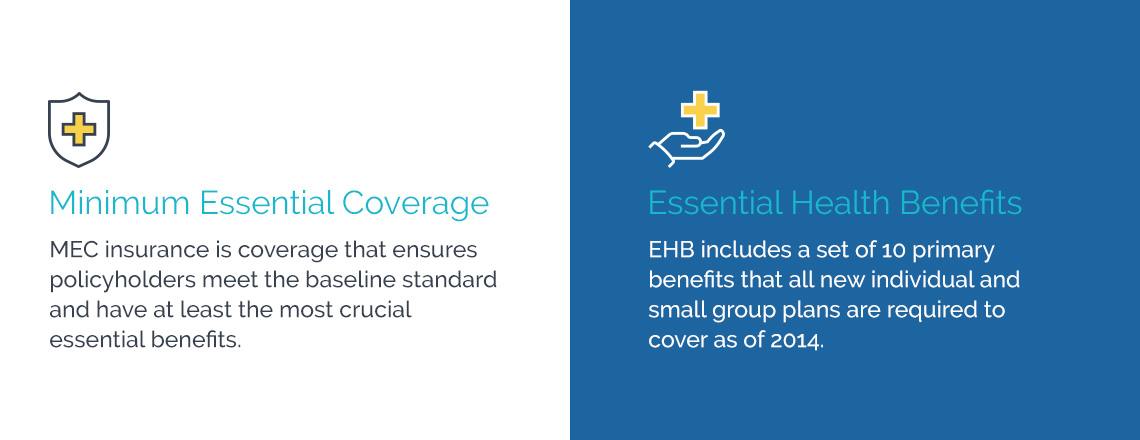Minimum Essential Coverage (MEC)
Minimum Essential Coverage (MEC)
Minimum Essential Coverage is a type of health insurance coverage needed to remain compliant with the individual mandate as required by the Affordable Care Act (ACA). If you live in California, you’ll need MEC insurance to avoid a tax penalty.
Health Insurance That Meets MEC Requirements
Various options comply with the ACA’s requirements for MEC insurance plans. Here are some common health insurance options and who qualifies for this type of coverage:
- Most employer-sponsored plans: If an employer has at least 50 employees, they’re required to offer MEC to all full-time employees and their dependents.
- COBRA plans: This gives former employees, spouses and dependent children temporary continuation of health coverage at group rates in cases of employment termination or a reduction in the number of hours at their place of employment.
- Retiree plans: If you’re retired but do not yet qualify for Medicare, you can receive retiree health insurance from the Health Insurance Marketplace or, in some instances, a former employer.
- Covered CA plans: Covered California partners with 11 different health insurance companies to provide California state residents with MEC options. Although most people will be offered three or more health insurance options, everyone will get at least two.
- Marketplace plans: Every American can use the Health Insurance Marketplace to “shop” for the best health insurance for both individuals and families. Plus, it’s the only place where you can receive subsidized assistance from the government if you qualify.
- Individual and family plans: This option is health insurance purchased through an insurance carrier — for example, Health for California’s fast and simple application process.
- Individual “grandfathered” plans: Individuals who purchased their health insurance by March 23, 2010, or earlier may be “grandfathered” into their health insurance plan and retain the same rate they had previously. However, individuals should ensure with their carrier, as many policies have discontinued grandfathered plans.
- Medicare Part A and Medicare Advantage plans: These solutions are federal health insurance provided to those over the age of 65 or individuals with certain diseases or disabilities. To qualify, you must have had at least 10 years of Medicare-covered employment.
- Full-scope Medicaid or Medi-Cal: These options are federal and state programs that provide health coverage to low-income individuals and families or to those who are pregnant or have a disability and qualify for the programs.
- Children’s Health Insurance Program (CHIP): CHIP makes low-cost health coverage available to children in families that earn too much to qualify for Medicaid. It also may cover some pregnant women.
- Certain types of Veteran’s Affairs Benefits: Medical assistance programs are provided to those who served in the active military service and did not receive a dishonorable discharge. In some cases, benefits are provided to spouses and children as well.
- Certain types of TRICARE: This health care program is for active-duty and retired members of the uniformed services as well as their families and survivors.
- Peace Corps volunteer health benefits: The Peace Corps provides health care to all volunteers during their service and for one month after, during the transition process.
- Student Health Plans: Some schools provide students with affordable coverage during their time as students.
- Other: Some others include coverage designated by the U.S. Department of Health and Human Services as MEC.
Health Insurance That Does Not Meet MEC Requirements
Some health insurance types that do not meet ACA requirements for Minimum Essential Coverage include:
- Stand-alone vision and dental plans
- Disability or accident income insurance
- Short-term medical or temporary insurance
- Specific disease policies
- Certain AmeriCorps or AfterCorps coverage
- Travel insurance
- Medical discount plans
- Workers’ compensation insurance
- Certain types of limited Medicaid
Minimum Essential Coverage vs. Essential Health Benefits

While similar, there are slight differences between MEC and the Essential Health Benefits. MEC insurance is coverage that ensures policyholders meet the baseline standard and have at least the most crucial essential benefits. In contrast, EHB includes a set of 10 primary benefits that all new individual and small group plans are required to cover as of 2014. Some plans may still meet MEC requirements without covering certain Essential Health Benefits, such as grandfathered plans or large group plans.
FAQs: Minimum Essential Coverage
Still have questions? Here are some of the most common queries about MEC.
What Are the MEC Requirements?
You’ll generally uphold MEC requirements when the coverage meets personal and family needs. The individual mandate is satisfied when you enroll in one of the following plans, as long as it covers the 10 essential health benefits outlined by HealthCare.gov:
- Individual health coverage: You purchase this policy independently to cover yourself and your family.
- Government-sponsored programs: Government-sponsored plans allow you to qualify for an insurance policy at a lower cost, provided you meet certain age, income level or disability status factors.
- Employer-sponsored coverage: This may include any group health insurance policy offered by your employer.
What Does an MEC Plan Cover?
An MEC plan should cover the 10 essential health benefits as stated by HealthCare.gov:
- Emergency services: If the policyholder has an emergency, they should be able to receive care from both in-network and out-of-network facilities.
- Ambulatory patient services: This refers to all outpatient care you might receive without being admitted to a hospital.
- Hospitalization: The insured should be able to receive inpatient care, like overnight stays and medically necessary surgeries.
- Laboratory services: This should include preventive screening services, diagnostic lab tests and tests for conditions like diabetes and high cholesterol.
- Prescription drugs: This covers certain prescription medications such as preventive medication and contraceptive drugs.
- Maternity, pregnancy and newborn care: This includes care before, during and after birth, along with breastfeeding and birth control coverage.
- Mental health services: Policyholders should have access to psychotherapy, counseling and necessary general behavioral health treatment. This also includes substance use disorder services.
- Rehabilitative and habilitative services and devices: This health benefit provides the necessary services and devices to help insured members when they have an injury, disability or chronic condition.
- Pediatric services: These involve medical care for children’s emotional, physical and social well-being, including oral and dental care.
- Preventive and wellness services: These services should include annual checkups and screening for common types of cancer. They also involve chronic disease management.
What Is the Penalty for Not Meeting MEC Requirements?
Not complying with the individual mandate may cause you to receive a penalty of a specific fee on your tax return. While the particular amount is not specified, California’s Franchise Tax Board (FTB) outlines general penalties for not having coverage.
Californians without coverage for themselves and their children and who do not meet an exemption should pay a penalty of $900 or more per adult and $450 per dependent child. Otherwise, they may receive a penalty of 2.5% of their gross income over the filing threshold, depending on which amount is higher.
Do All States Require Compliance With MEC Standards?
No. Some states do not enforce the individual mandate federal penalties. Those that do require MEC health coverage compliance include California, New Jersey, Washington, D.C., Massachusetts, Rhode Island and Vermont.
Get Health Insurance With Health for California
Are you looking to apply for an MEC-compliant health insurance plan? Our knowledgeable professionals at Health for California offer an easy and fast way to apply for MEC-compliant health insurance in California. The Affordable Care Act insurance law promotes marketplaces like Covered California, the state’s health insurance marketplace, as ideal options to find health care plans that meet MEC requirements.
We offer guidance and free instant quotes so you get coverage that fits your unique needs. To get started, fill out our confidential form today.

